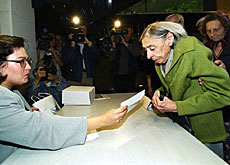Jewish group marks 100 years of bridge-building

The Swiss Federation of Jewish Communities has been working to eliminate prejudices against Jews in Switzerland for 100 years.
But when it was set up in 1904, the federation’s main aim was to fight the ban on the ritual slaughter of animals in Switzerland.
“We are still trying hard to get rid of the prejudices against Jews and combat anti-Semitism in Switzerland – as far as that’s possible,” Thomas Lyssy, vice president of the federation, told swissinfo.
“But there are still people around who don’t really want to listen and so don’t hear.”
Lyssy says the Jews in Switzerland are still seen as a minority and are not really regarded as Swiss, even though most of the 20,000 Jews living here have a Swiss passport.
Hostility
And, he says, whenever tensions in the Middle East escalate hostility towards Jews in Switzerland increases.
“Sometimes it’s as if I was in the helicopter when [Hamas founder] Sheik Ahmed Yassin was assassinated,” he told swissinfo.
The Jewish community in Switzerland represents a very broad political spectrum, and it does not have an official line on the conflict in the Middle East.
“We are not for or against [Israeli prime minister] Ariel Sharon, and we don’t take a view on the Israeli withdrawal from the occupied territories,” he added.
Increased hostility against Jews normally results in tighter security at Jewish institutions in Switzerland, Lyssy said.
“It is almost impossible to enter a Jewish community centre or a Jewish school without undergoing thorough checks,” he said, adding that most Jewish people were now used to this.
Kosher meat
The ban on the ritual slaughter of animals is still an issue in Switzerland. In March 2002 the government indicated that it was willing to lift the ban, which was seen as infringing the religious freedom of Jews and Muslims.
But it caved in after the idea was greeted with outrage by a majority of cantons, animals rights and consumer groups as well as vets and farmers, who argued that the practice inflicted unacceptable suffering on animals.
The government’s change of heart was a blow to the federation, which was set up to fight the ban on ritual slaughter of animals.
Meat produced in conformity with Jewish religious law has traditionally been imported to Switzerland, but imports of kosher meat could be threatened after the Swiss Society for Animal Protection (PSA) launched an initiative last year seeking to ban it.
Holocaust assets
Another role the federation has played has been that of mediator between international Jewish Organisations (notably the World Jewish Congress), and Swiss banks and the government in the Holocaust assets affair.
In the mid 1990s Switzerland came under heavy criticism for its dealings with Nazi Germany during the Second World War.
The former president of the federation, Rolf Bloch, managed to convince the government that Switzerland had to own up to its wartime mistakes.
In 1997 the government founded the “Swiss Fund for Needy Victims of the Holocaust” with around SFr300 million ($234 million) from the banks and industry.
During the Nazi era Switzerland pursued a very restrictive policy towards the Jewish community, and the federation backed these policies as it was important for them to be in harmony with the government.
“By backing the government the federation wanted to avoid endangering Jews in Switzerland and refugees,” Lyssy told swissinfo.
“But there are still so-called historians who blame the federation and the Swiss Jews for the country’s refugee policies,” he added.
swissinfo, Gaby Ochsenbein (translation: Billi Bierling)
The Swiss Federation of Jewish Communities was set up on November 27, 1904 in the town of Baden.
The federation comprises 18 Jewish communities and about 18,000 people.
The mandate of the federation:
Promoting Jewish interests in Switzerland.
Representing Jewish interests at Swiss and international organisations.
Fighting anti-Semitism and racism in Switzerland.
Dealing with the Holocaust and Swiss refugee policy.
Alfred Donath has been president of the federation since 2000.

In compliance with the JTI standards
More: SWI swissinfo.ch certified by the Journalism Trust Initiative













You can find an overview of ongoing debates with our journalists here . Please join us!
If you want to start a conversation about a topic raised in this article or want to report factual errors, email us at english@swissinfo.ch.